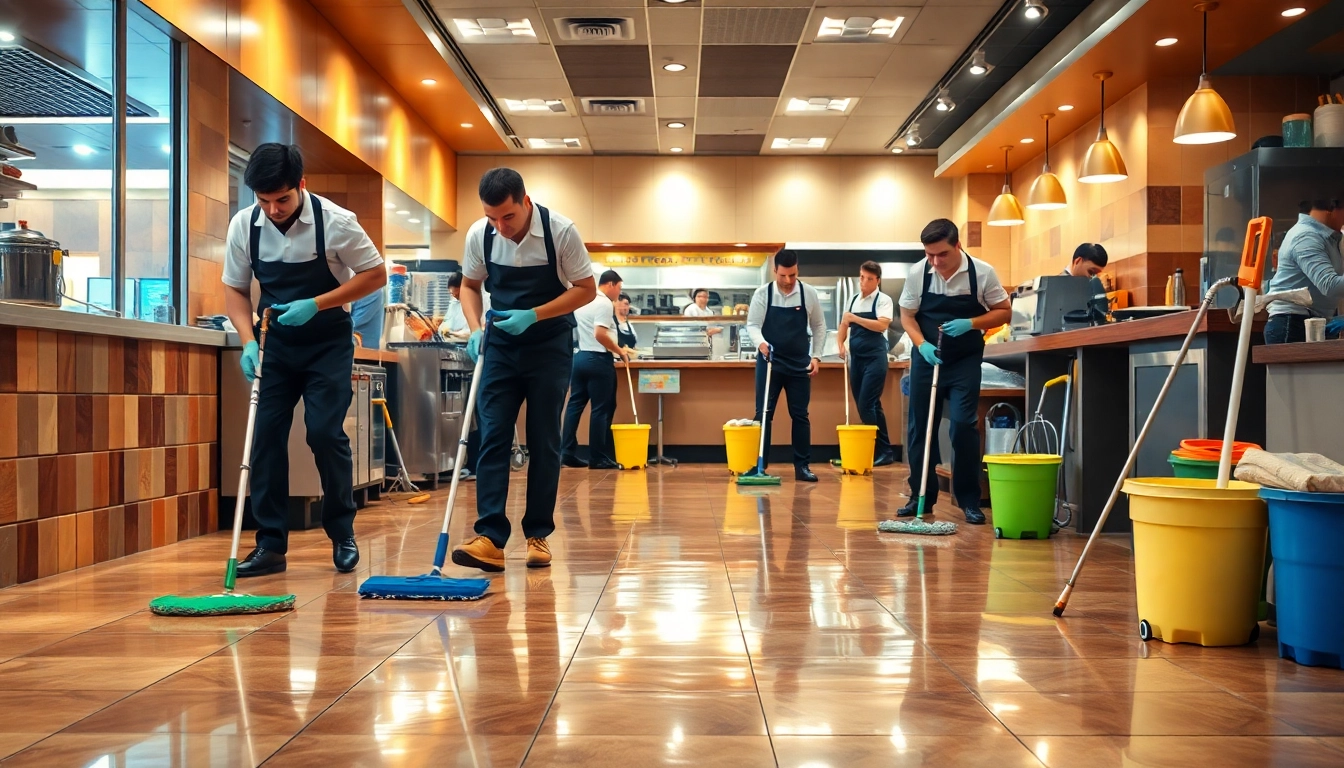Understanding the Importance of Restaurant Janitorial Cleaning Service
In the food service industry, maintaining a pristine environment is not merely a matter of aesthetics; it is a fundamental requirement to ensure the health and safety of both customers and staff. Therefore, investing in a comprehensive Restaurant Janitorial Cleaning service is essential. This article explores why these services are pivotal for restaurants and the key components and trends that define quality cleaning in the sector.
Health and Safety Regulations in Restaurants
Health regulations govern many aspects of restaurant operations, including hygiene protocols. Regulatory agencies, such as the Food and Drug Administration (FDA) and local health departments, set strict standards aimed at preventing foodborne illnesses and ensuring safe dining environments. Failure to adhere to these regulations can lead to severe penalties, including fines and even temporary suspension of operations.
Restaurants must conduct regular cleaning and sanitization, particularly in areas that come into contact with food, utensils, and dining surfaces. Moreover, maintaining a clean kitchen is not only crucial for compliance but also helps in managing pests and pathogens that could compromise health and safety.
The Role of Cleanliness in Customer Satisfaction
Research shows that a clean dining environment plays a crucial role in customer satisfaction. Many diners assess a restaurant’s cleanliness by the state of its restrooms, dining areas, and the visible cleanliness of staff handling food. Reviews and ratings on platforms like Yelp and TripAdvisor often reflect patrons’ opinions about cleanliness, directly influencing repeat business.
Furthermore, a clean restaurant upholds the establishment’s brand image, fostering trust and a sense of professionalism. Customers are more likely to recommend a restaurant that prioritizes cleanliness, leading to increased traffic and sales revenue.
Environmental Benefits of Professional Cleaning
Engaging in an environmentally conscious cleaning program can contribute to sustainability efforts within a restaurant. Professional cleaners often utilize eco-friendly products and practices that minimize harmful chemical exposure to both humans and the environment. For instance, utilizing green cleaning solutions can greatly reduce indoor air pollution, a common issue in kitchens that heavily rely on toxic cleaning agents.
Moreover, a professional cleaning service can help implement waste reduction strategies and ensure that recyclable and compostable materials are handled properly, promoting a more sustainable restaurant operation.
Key Components of an Effective Restaurant Janitorial Cleaning Service
Essential Tools and Supplies Required
The effectiveness of a restaurant janitorial cleaning service depends heavily on having the right tools and supplies. Items such as commercial-grade vacuums, industrial mop systems, sanitizing solutions, and microfiber cleaning cloths are indispensable for thorough cleaning across surfaces. Moreover, specialized equipment like floor scrubbers can be crucial for larger establishments with significant foot traffic.
Alongside these tools, proper storage facilities for cleaning supplies must be maintained, following OSHA regulations to ensure they are safely stored and accessible only to authorized personnel. Keeping an inventory of supplies on hand helps prevent running out of essential materials during peak service times.
Cleaning Protocols and Best Practices
Defining cleaning protocols tailored to the specific operational needs of a restaurant is essential. For instance, employees should be trained on the correct procedures for cleaning food prep areas versus dining spaces. Regular training and refreshers on these protocols will enhance effective practices and adherence among all staff members.
Common best practices include:
- Adopting a “clean as you go” approach in kitchens to maintain cleanliness throughout food preparation.
- Establishing a checklist for cleaning tasks performed daily, weekly, and monthly, ensuring comprehensive cleanliness.
- Implementing color-coded cleaning cloths and mops to prevent cross-contamination.
Frequency and Timing of Cleaning Services
The frequency and timing of cleaning services significantly impact the cleanliness of a restaurant. High-traffic areas may require more frequent cleaning, such as between shifts, while less frequented areas can be cleaned less often. Identifying peak hours can help in scheduling cleaning during off-peak times to avoid disrupting operations.
Additionally, conducting deep cleaning services during slower periods or after hours can ensure all spaces are sanitized without interfering with customers.
Choosing the Right Restaurant Janitorial Cleaning Service
Criterions for Evaluating Cleaning Providers
When selecting a janitorial cleaning service, several criteria should be considered. First, evaluate their experience and specialization in the restaurant sector. A provider familiar with the nuances unique to food service establishments will be better equipped to meet your cleaning needs.
Secondly, inquire about their cleaning protocols, training of staff, safety records, and adherence to health regulations. Transparency in these areas is critical for building trust and ensuring quality service.
Assessing Certifications and Training of Staff
Certifications and ongoing training programs for cleaning staff are essential indicators of a quality janitorial service. Staff should be educated on the latest health and safety protocols, as well as eco-friendly cleaning techniques. Look for services that invest in their staff’s training; this commitment reflects the company’s dedication to providing excellent service.
Customer Reviews and Testimonials
Customer reviews and testimonials can provide valuable insights into the effectiveness of a janitorial cleaning service. Reading real client feedback can highlight potential issues or strengths of a service provider. Additionally, consider reaching out to other restaurant owners or managers for recommendations based on their firsthand experiences.
Cost Considerations for Restaurant Janitorial Cleaning Service
Average Costs and Pricing Models
Understanding the cost structure for restaurant janitorial cleaning services is crucial for financial planning. Prices can vary widely based on the size of the establishment, frequency of service, and specific requirements. It’s common to see cleaning services charge an hourly rate or monthly flat fee.
On average, restaurants can expect to spend anywhere from $100 to $500 per month for regular cleaning services, depending on the complexity of tasks and the type of cleaning required.
Budgeting for Regular Cleaning Services
When budgeting for cleaning services, it is advisable to factor in not only the cost of direct cleaning fees but also potential costs related to health violations due to inadequate cleanliness. Establishing a consistent cleaning schedule can help mitigate risks and manage financial planning more effectively.
Moreover, consider setting aside a contingency fund for unexpected additional cleaning services, which may arise during peak seasons or renovations.
Calculating ROI from Effective Janitorial Services
Investing in a professional Restaurant Janitorial Cleaning service not only improves cleanliness but can also translate to an increased return on investment (ROI). By analyzing factors such as improved customer satisfaction, reduced health risks, and enhanced employee productivity, restaurants can see tangible benefits from maintaining a clean environment.
For example, establishments that prioritize cleanliness often enjoy higher customer retention rates, leading to elevated sales figures and customer loyalty over time.
Innovations and Trends in Restaurant Janitorial Cleaning Service
Eco-Friendly Cleaning Solutions
The growing emphasis on sustainability has spurred a trend towards eco-friendly cleaning solutions in the restaurant industry. Many cleaning services now offer green cleaning products that are biodegradable, non-toxic, and safe for use around food. These products not only support environmental responsibility but also cater to the increasing number of health-conscious diners.
Adopting eco-friendly solutions can enhance customer perceptions and brand loyalty while contributing to broader sustainability initiatives.
Technology Integration in Cleaning Practices
Technology is increasingly being integrated into restaurant janitorial practices. Innovative cleaning tools, such as robotic vacuums and automated floor scrubbers, have emerged, allowing for improved efficiency and effectiveness in cleaning tasks. Furthermore, software solutions that manage cleaning schedules and track cleaning tasks are also becoming more prevalent.
Utilizing these technological advancements can streamline cleaning operations, reduce labor costs, and maintain high cleanliness standards.
The Future of Restaurant Cleaning Services
As consumer expectations rise, the future of restaurant cleaning services will likely focus on enhanced sanitation practices and efficient cleaning solutions. The ongoing impact of the COVID-19 pandemic has instilled a heightened focus on hygiene, prompting many establishments to adopt more rigorous cleaning protocols.
Additionally, the trend towards sustainability and innovation will continue shaping the landscape, where restaurants will seek cleaning services that align with their operational goals and values.




